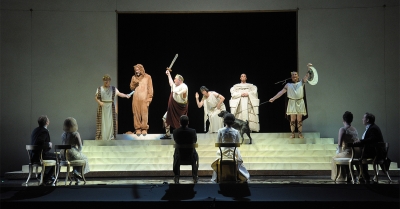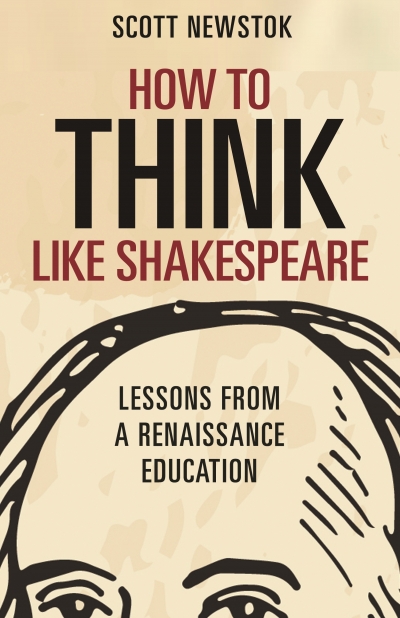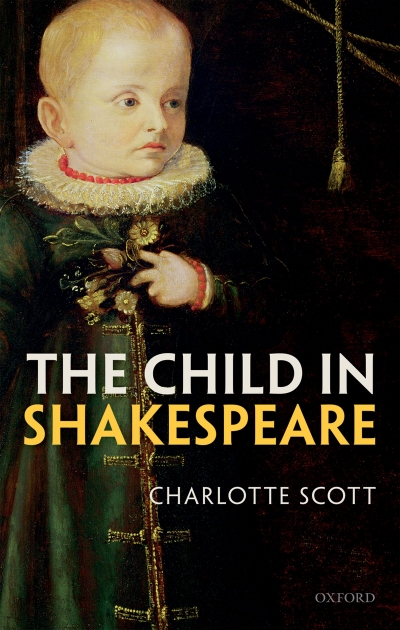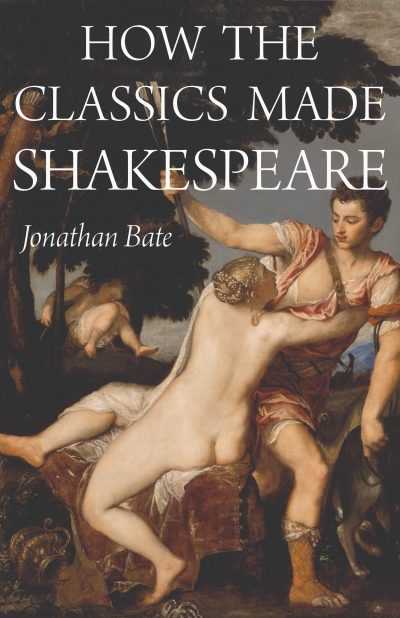William Shakespeare
January 5
We have lost our Hermia, so Sally-Anne Russell comes round to sing for me. She has fished out Benjamin Britten’s Charm of Lullabies and her score of The Rape of Lucretia. We work on both, but particularly on the aria in which poor Lucretia threads together gorgeous lilies into a funeral wreath, her response to what the boastful, ghastly Tarquinius has done to her. Sally-Anne has not sung the opera for twenty-five years, but it sounds as though she’s fresh from recording it, so inside the role is she, so beautiful and rich her voice. I phone Neil Armfield. We have found our Hermia.
... (read more)How to Think Like Shakespeare: Lessons from a Renaissance education by Scott Newstok
In an early episode of the cult Canadian television series Slings & Arrows (2003), the director of the ‘Burbage Festival’ finds himself addressing a corporate audience, forced to teach management strategy through Shakespeare: ‘Do any of you seriously believe that you’re going to sell more plastics products to the construction industry by studying, say, the crisis management techniques of Claudius?’ Fortunately, Scott Newstok wouldn’t be answering that question in the affirmative. His How to Think Like Shakespeare doesn’t strain analogies or instrumentalise Shakespeare’s plays and characters to make Shakespeare seem relevant to patently unrelated contexts; rather, it explores both Shakespeare’s thinking and the ‘educational assumptions that shaped Shakespeare’ (since these frequently differ from our own system of education). At the heart of this book is Newstok’s conviction that ‘education must be about thinking – not training a set of specific skills’. After all, there is nothing either good or bad but thinking makes it so.
... (read more)The figure of the child stands at both ends of human experience in Shakespeare’s plays. The span between our ‘mewling and puking’ infancy and our ‘second childishness’ of old age runs to little more than a dozen lines in Jacques’s famous ‘seven ages of man’ speech in As You Like It, before we slip into ‘mere oblivion, / Sans teeth, sans eyes, sans taste, sans everything.’ In the intervening years, our identity as children might shift as we undergo rites of passage into adulthood, as our relationships with our own parents evolve or as we become parents ourselves. But the child – the archetype of our essential nature – waits patiently for our return. Even Lear, the grand patriarch who disowns the truth-speaking child of his heart, must be racked on the fiery wheel of experience before he can become the ‘child-changed father’ Cordelia recognises in the end.
... (read more)In a much-cited letter to Francesco Maria Piave, his librettist for Macbeth, Verdi wrote, ‘This tragedy is one of the greatest creations of the human spirit. If we can’t do something great with it, let us at least try to do something out of the ordinary.’ As it happens, they did do something laudable with the Scottish Play ...
... (read more)What can you do with Shakespeare’s Titus Andronicus, a play full of murder, mutilation, and rape, culminating in a mother eating a pie filled with her sons’ ground-up body parts? For centuries it was dismissed as the early aberration of a genius, a sop to the bloodthirst of Elizabethan audiences ...
... (read more)Ben Jonson famously derided Shakespeare’s grasp of ‘small Latin and less Greek’, and vocal sceptics in our own time refuse to believe that a grammar-school education was sufficient to enable the man from Stratford to write the plays attributed to ‘Shakespeare’ ...
... (read more)There is much conjecture around the concept of Shakespeare’s ‘problem plays’; critics disagree not only on the strict meaning of the term – F.S. Boas saw them as works that used a protagonist’s dramatic situation to illustrate a social problem, while Ernest Schanzer insists they turn on an ethical dilemma ...
... (read more)In 2017, Oskar Eustis directed the Public Theater production of Julius Caesar – a play that pivots on the assassination of a political leader – in Central Park with a lead actor who bore an unmistakable likeness to the forty-fifth president of the United States. The conservative backlash was swift and powerful ...
... (read more)Performing Hamlet: Actors in the modern age by Jonathan Croall
'It is arguably the most famous play on the planet’, writes Jonathan Croall in his introduction to this absorbing study of how the play and its eponym have gripped the imagination across the ages – and, as far as this book is concerned, particularly across the last seventy years. Whether for actor or director, Hamlet has always been ‘a supreme challenge’, making huge demands on those bringing it to theatrical life.
... (read more)Twelfth Night was probably composed in 1601, and certainly no later than 1602. Hamlet has a more doubtful provenance, possibly written before 1601 but also certainly no later than 1602. It is not inconceivable that Shakespeare worked on them simultaneously, or back to back ...
... (read more)










